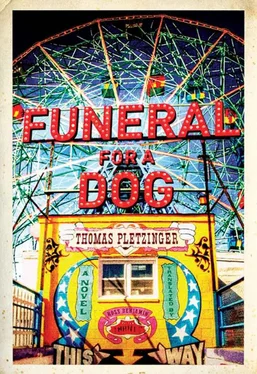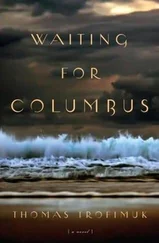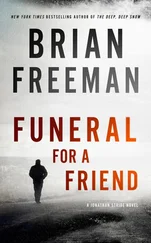Astroland
Svensson and I in white shirts and flip-flops, he holds the door for me, I carry my red plastic bag with the notebooks out of his room (headache). My second thought, as I pass Svensson on my way out the door: I won’t be able to take the manuscript with me if he’s bringing me to Lugano now. I should leave with the hidden stories, but the stack of paper is in Svensson’s old suitcase ( Astroland is the reason I’m here). After you, Mandelkern, says Svensson, closing the door behind me, after you (as if nothing happened). I wrapped up the stack of paper again and put it back in the suitcase when the roosters began to crow (my journalistic thoroughness).
Tuuli
On the stairs, passing the pictures of black, dying animals, I’m struck by the question of why Svensson wants to get my departure over with today and so early in the morning, of all times, even though yesterday my presence still seemed to be pleasant to him (we ate his fish, drank his wine, his gin). Tuuli and I offered each other cigarettes by the pack. I smoked what I could smoke, my night was short (now I’m paying for it). Then in the kitchen the emptied ashtray, the sorted empty bottles, the clean plates (the glass shards in the middle of the table). Svensson hurries ahead, and I follow him like a dog (my sudden nausea, the spring in his step). My third thought: I got too close to Tuuli. We sleep in adjacent rooms, I could have knocked on her door. She seems to still be asleep, she and the boy are nowhere to be seen (her Finnish-plumed singing on the other side of the wall while I was reading). I won’t meet her again, I think, as Svensson and I walk side by side to the water, I don’t even know her last name. I wonder what I’ve done wrong, why Svensson wants to get rid of me. Could he be more than just strange? 288 meters. The air over the lake is slightly hazy this morning, distant chainsaws, the sun is still waiting behind the mountains. Svensson is bigger than I, the borrowed shirt flutters around my body, the sleeves too long, I have to roll them up (his shoulders and strides, as if he made a decision).
Lua’s Spot
A yellow swan stretches its neck. It stretches it up along the wooden side of the boat and toward Svensson, he feeds it seeds from his pants pocket and mimics the animal (the forward and back of both heads). When I reach out my hand, the swan hisses, as if I came too close to it. Cygnus olor , says Svensson, directing me to the bench in the bow, the mute swan. I feel like I’m going to throw up, Svensson has jumped onto the boat and is observing me from the stern as I clumsily climb on (he doesn’t help me). Lua is still lying motionlessly by the water, he doesn’t even lift his head when Svensson revs up the outboard motor (Evinrude 25). Lua doesn’t look up when the motor starts only on the seventh try, when Svensson laughs and curses, when the swan thrusts out its head and hisses (the multihued gas on the water, in its feathers). The mute swan, says Svensson, commits for life. Above all during mating season the males are very aggressive and defend their territory against people too. They hiss and with a well-aimed blow of the wingtip can break human bones. Then he turns his wrist, Macumba rises steeply and moves out onto the lake in a wide curve (for a few seconds I’m looking down at Svensson). House and dog quickly grow smaller, the swan soars from the water with three or four heavy strokes of its wings and follows the boat. He likes these birds, says Svensson, they have their memories and their freedom. That’s enough for them. But that freedom doesn’t last forever either. Memories disappear too, if one doesn’t do anything to stop it. Svensson observes the swan. Of course animals can’t tell their stories. He looks at me. Of course not, I say, because I now have to say something (the pollen on the water’s surface like souls). Just as none of us can tell our own stories. As an author of children’s books he must be acquainted with this dilemma, I say, but also as a novelist
(I break off)
Then my fast talking about myself as an ethnologist and my notes, as if I could take back my remark (the remaining color drains from our faces). Svensson suddenly smiles at me, he rolls up his sleeves once more, showing me his upper arms. Then he revs up the motor somewhat and steers Macumba in a straight line into the middle of the lake. The passing thought: the suitcase, his manuscript, Svensson has noticed my spying. Now he wants to get rid of me. You look at surfaces, says Svensson, and make your articles out of them. What do you know about writing, Mandelkern?
Interview (nausea)
SVENSSON: You look so pale all of a sudden, Mandelkern, are you nauseous?
MANDELKERN: A little. The gin.
S: That was good gin. The cigarettes?
M: Maybe the fish.
S: The fish was fine, Mandelkern.
M: Can you drive somewhat slower?
S: You mentioned your questions, Mandelkern, now would be the right time.
M: Isn’t Lugano in the other direction?
S: Lugano?
M: Yes?
S: Yes.
M: Okay.
S: Is that all you wanted to know?
M: Well. The fact that you live in solitude here. For example.
S: Yes?
M: I mean: why do you live here of all places? Why not in America?
S: America?
M: Or Berlin, if you prefer.
S: Go stand over the water and look out at the lake, Mandelkern, the mountains sleeping animals, ships with the speed of glaciers, below the surface the fish, over the lake the clouds and the whizzing of the swallows overhead. Swallows turn gracefully, have you ever noticed that? Tourists come here only with the ferry. When any come at all. The overland route isn’t interesting enough, the road clings to concrete piers just over the water. There’s nothing here. A rundown campground, three or four rusty garages, a quarry without orders. Back there. You see? Nothing else. Even the curves are not as sharp as on the other side of the lake. Over there. Now and then the seasons. The sage grows and lemons and kumquats. I wake up and go to sleep, and all this would go on exactly the same way without me. Every day the church tower clocks make their odd music. I could work anywhere, but here I’m not so important. This house stands at the edge of time. Here the dog has his peace.
M: How’s the dog doing?
S: How are you doing, Mandelkern? You look bad.
M: You obviously have a higher tolerance for alcohol than I.
S: Come on. That was only one glass of good gin.
M: A water glass.
S: And I trust the fish seller here. We all ate fish.
M: Fish seller?
S: We don’t have much time. Keep asking your questions, if you can.
M: Is it going to be just the one children’s book? Or are you already working on the next one?
S: I’m trying to give memory time.
M: Your book is based on memories?
S: I think people can only write about themselves. And fail at it.
M: But the themes of loss and compensation have significance for many people.
S: Good observation.
M: Can you explain your work method?
S: I wake up and feed the chickens. Then I see what needs to be done. I build a cistern. I renovate. This and that.
M: I mean: Are you primarily an author or an illustrator?
S: The pictures are not by me. The pictures are by Kiki Kaufman.
M: I see. And where did you get the idea?
S: Death dictated the story to me. Yesterday was the anniversary of a death, Mandelkern.
M: I heard.
S: What did you hear?
M: Felix Blaumeiser has been dead for three years.
S: I wonder whether you should use this information at all. It’s not that simple, of course. Maybe our interview is unusable.
M: Any information is helpful.
S: Felix Blaumeiser drank himself to death, and yesterday we toasted to that.
Читать дальше












